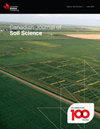加拿大人类改良土壤的拟议分类:人类类人学顺序
IF 1.5
4区 农林科学
Q4 SOIL SCIENCE
引用次数: 3
摘要
Naeth, m.a., Archibald, h.a., Nemirsky, c.l., Leskiw, l.a., Brierley, j.a., Bock, m.d., VandenBygaart, a.j.和Chanasyk, d.s. 2012。加拿大人类改良土壤的拟议分类:人类类人学顺序。可以。土壤学报,32(2):718 - 718。随着人类活动的增加,受干扰土壤的面积越来越大,干扰也越来越强烈。管理框架必须纳入这些受干扰土壤的复垦标准,要求一致的描述和解释。加拿大土壤分类系统(Canadian System of Soil Classification, CSSC)无法对许多人类改变的土壤进行分类,因此提出了一个人类类群目。人壤是由人类活动高度改变或构建的地域性土壤,其中一个或多个自然层被移除、移除和替换、添加或显著改变。定义特征是土壤形成因素的严重破坏和潜在的新成土轨迹的引入。扰动层是由人类活动引起的,其中含有经人类活动在物理和/或化学上显著改变的物质。根据人为人工制品的存在和有机碳含量划分了三大类。六个亚组是基于有机碳含量高于其下方剖面的覆盖土层、扰动深度、排水特征和场地的水状况。除了CSSC中使用的传统相和改性剂外,还有一些新的相和改性剂是基于人为人工制品的化学和物理性质以及来源。提出的分类方法已成功应用于回收剖面,并准备进行广泛的现场测试。本文章由计算机程序翻译,如有差异,请以英文原文为准。
Proposed classification for human modified soils in Canada: Anthroposolic order
Naeth, M. A., Archibald, H. A., Nemirsky, C. L., Leskiw, L. A., Brierley, J. A., Bock, M. D., VandenBygaart, A. J. and Chanasyk, D. S. 2012. Proposed classification for human modified soils in Canada: Anthroposolic order. Can. J. Soil Sci. 92: 7-18. With increasing anthropogenic activity, the areal extent of disturbed soils is becoming larger and disturbances more intense. Regulatory frameworks must incorporate reclamation criteria for these disturbed soils, requiring consistent descriptions and interpretations. Many human altered soils cannot be classified using the Canadian System of Soil Classification (CSSC), thus an Anthroposolic Order is proposed. Anthroposols are azonal soils, highly modified or constructed by human activity, with one or more natural horizons removed, removed and replaced, added to, or significantly modified. Defining features are severe disruption of soil forming factors and introduction of potentially new pedogenic trajectories. Disturbed layers are anthropic in origin and contain materials significantly modified physically and/or chemically by human activities. Three great groups are defined by presence of anthropogenic artefacts and organic carbon content. Six subgroups are based on a cover soil layer with higher organic carbon content than the profile below it, on depth of disturbance, on drainage characteristics and water regime at the site. Some new phases and modifiers, in addition to traditional ones used in the CSSC, are based on chemical and physical properties and origins of anthropogenic artefacts. The proposed classification has been successfully applied to reclaimed profiles and is ready for widespread field testing.
求助全文
通过发布文献求助,成功后即可免费获取论文全文。
去求助
来源期刊

Canadian Journal of Soil Science
农林科学-土壤科学
CiteScore
2.90
自引率
11.80%
发文量
73
审稿时长
6.0 months
期刊介绍:
The Canadian Journal of Soil Science is an international peer-reviewed journal published in cooperation with the Canadian Society of Soil Science. The journal publishes original research on the use, management, structure and development of soils and draws from the disciplines of soil science, agrometeorology, ecology, agricultural engineering, environmental science, hydrology, forestry, geology, geography and climatology. Research is published in a number of topic sections including: agrometeorology; ecology, biological processes and plant interactions; composition and chemical processes; physical processes and interfaces; genesis, landscape processes and relationships; contamination and environmental stewardship; and management for agricultural, forestry and urban uses.
 求助内容:
求助内容: 应助结果提醒方式:
应助结果提醒方式:


